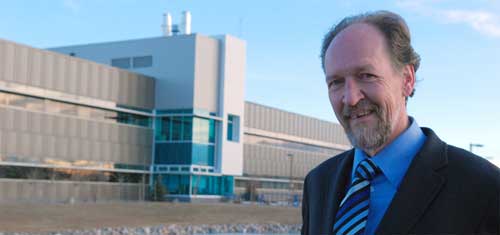Professor of biological sciences Dr. Joseph Rasmussen has made outstanding contributions in fisheries and aquatic biology for three decades.
For his distinguished record of achievement and enduring contributions to these areas of study, the University of Lethbridge has named Rasmussen as the recipient of the 2012 Ingrid Speaker Medal for Distinguished Research, Scholarship, or Performance.

A Tier 1 Canada Research Chair, Rasmussen is the director of the University of Lethbridge's Water Institute for Sustainable Environments (WISE). His research papers have been published in several elite science journals, including Nature, the Proceedings of the National Academy of Sciences, Ecology Letters, Ecological Monographs and the Canadian Journal of Fisheries and Aquatic Sciences, the latter of which is the leading international journal for aquatic sciences.
Some of Rasmussen's work has resulted in crucial research advances. He is a pioneer in using stable isotopes to characterize food web systems, and his work has had major impacts on biomagnification, toxic substances and studies of the invasion by exotic species. His expertise in aquatic ecology led to his appointment to Environment Canada's National Oilsands Review Panel. In 2010, the Society of Canadian Limnologists awarded him the Frank H. Rigler Memorial Award, the society's highest honour.
"It was very gratifying to receive an award that has been given to many excellent scientists over the years, and to have my name associated with that of professor Rigler, who had such a profound impact on limnology and aquatic science in general," says Rasmussen of the honour.
His work has had significant scholarly impact as well. Rasmussen's cumulative citation record is impressive, with over 7,000 citations on the Web of Science, and over 9,000 on Google Scholar, showing that his research papers are very influential in advancing the field of ecology.
This story first appeared in the May issue of the Legend. For a look at the full issue in a flipbook format, follow this link.
